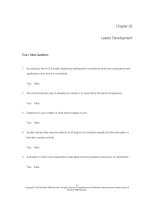Lecture Leadership: Enhancing the lessons of experience (4/e) – Chapter 8
Bạn đang xem bản rút gọn của tài liệu. Xem và tải ngay bản đầy đủ của tài liệu tại đây (394.89 KB, 12 trang )
81
McGrawHill/Irwin
© 2002 The McGrawHill Companies, Inc., All Rights Reserved.
C
HAPTER
E
IGHT
Leadership Behavior
The Building Blocks Of Skills
Initiating Structure & Consideration
Employee & JobCentered Dimensions
The Leadership Grid
360Degree Feedback
Behavior/
Skills/
Competencies
Knowledge
Intelligence
McGrawHill/Irwin
Managerial Derailment
SelfDefeating Behaviors
Coaching & Mentoring Behaviors
Experience
Personality
Traits and
Preferences
Values
Interests
Motives/Goals
© 2002 The McGrawHill Companies, Inc., All Rights Reserved.
83
Leader Behavior Description
Questionnaire
Subordinates were asked to rate the leader on
the following behaviors:
Lets subordinates know when they’ve done a
good job.
Sets clear expectations about performance.
Shows concern for subordinates as individuals.
Makes subordinates feel at ease.
McGrawHill/Irwin
© 2002 The McGrawHill Companies, Inc., All Rights Reserved.
84
Four Categories That Contribute To
Effective Group Performance
•
•
•
•
Leader support
Interaction facilitation
Goal emphasis
Work facilitation
McGrawHill/Irwin
© 2002 The McGrawHill Companies, Inc., All Rights Reserved.
85
Sources For 360degree Feedback
Boss
Self
360º Feedback
Results
Peers
Direct Reports
McGrawHill/Irwin
© 2002 The McGrawHill Companies, Inc., All Rights Reserved.
86
Questions Addressed By Recent
360º Feedback Research
• Does 360º feedback matter?
• Are selfobserver perceptual gaps
relevant?
• Does 360º feedback improve leaders’
ratings over time?
• Are there meaningful culture, gender
or race issues with 360 º feedback?
McGrawHill/Irwin
© 2002 The McGrawHill Companies, Inc., All Rights Reserved.
87
Why It’s Important for Practitioners
to Understand 360º Feedback
• It’s likely that practitioners will receive
this type of evaluation.
• Describes the leadership behaviors
needed to achieve organizational goals
(if it’s built around an organization's
competency model).
• May be one of the best sources of
“how” feedback for leadership
practitioners.
McGrawHill/Irwin
© 2002 The McGrawHill Companies, Inc., All Rights Reserved.
88
89
Why It’s Important for Practitioners to Understand
360º Feedback, continued
• Effective leaders seem to have a broad
set of welldeveloped leadership
skills.
• Leaders need to create specific goals
and development plans in order to
improve leadership skills.
• Leadership behavior can change over
time.
• There are cultural, racial and gender
issues.
McGrawHill/Irwin
© 2002 The McGrawHill Companies, Inc., All Rights Reserved.
Four Themes in Derailment Research
• Problems with interpersonal
relationships
• Failure to meet business objectives
• Inability to build and lead a team
• Inability to develop or adapt
McGrawHill/Irwin
© 2002 The McGrawHill Companies, Inc., All Rights Reserved.
810
811
The Development Pipeline
Initial
Capabilities
Insight
Motivation
New
Knowledge
and Skills
Real World
Application
Accountability
Increased
Capabilities
McGrawHill/Irwin
© 2002 The McGrawHill Companies, Inc., All Rights Reserved.
Copyright 2000 Personnel Decisions International Corporation. All Rights Reserved.
What Were the Most Useful Factors
in the Coaching You Received?
Handling
organizational
General
politics
encouragement
7%
7%
Understanding
organizational
objectives
7%
Clear, direct
feedback
36%
Advice on handling
situations
20%
A new perspective
23%
McGrawHill/Irwin
© 2002 The McGrawHill Companies, Inc., All Rights Reserved.
812









